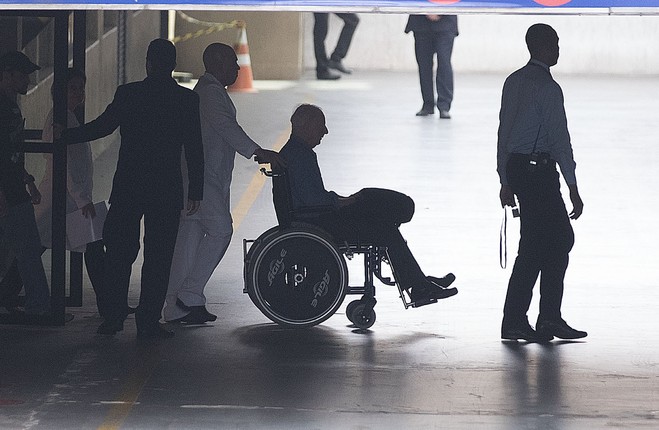SOME WILL CALL these dark times for the Olympics.
Some might say that the OCI ticket scandal puts the tin hat on a dreadful Games: damned before it started by the moral repugnancy of Rio, a city with such obvious poverty, hosting it at all, then marred in the buildup by the Russian drug scandal.
Then came the half-empty stadiums as ordinary Brazilians were priced out; athlete indignation at flagrant dopers; suspicious performances on the track, weird green stuff in the pool; boxing’s shameful judging controversy.
But, actually, in the long run, this might not be a bad Olympics at all. Because finally everyone can see the modern Games for what they are. For the first time, even the spectacular feats of the (clean) athletes and the enthusiasm of the volunteers can’t hide what the Olympics have become – and that can only be a good thing if they are to have a future.
The tarnishing of the Olympic spirit is hardly a new idea. But until now the glory of what happens during that fortnight every four years has managed to magically wipe away most of the stain. The drug cheats and greedy business interests, the tumbleweed strewn post-Games venues, the stupid cost of it all – these feel like mundane earthbound things in the face of the heavenly feats of Owens, Comaneci, Zatopek, Phelps, Redgrave.
No more.
Sure, we enjoyed and engaged with these Games as much as we could. In Ireland, we loved the O’Donovan brothers, we cried with Katie, we raged for Mick Conlan. Annalise Murphy was just brilliant. Thomas Barr was five hundredths from glory. Scott Evans. Oliver Dingley. Great stuff.
Then there were Biles, Ledecky, Bolt – even the golf was exciting. There was plenty to dazzle, if you wanted dazzling.
As usual, every night you could tune in and get caught up in something. Expertly judging the diving; trying to figure out what the hell the Omnium was all about; reckoning you could probably give archery a go. In that sense, it’s the Greatest (Game)Show On Earth. A TV distraction, an entertainment.
But while the Olympics always has you looking at the stars, this time it was impossible to ignore the gutter.
There was our own drugs shame with Michael O’Reilly. There were the former drug cheats we knew about: Sun Yang and Yulia Efimova in the pool and Justin Gatlin on the track being the most high profile of many. There were the performances that raised eyebrows: Almaz Ayana’s women’s 10,000 metre world record, greeted with scepticism by rivals and experts alike.
There were the performances that weren’t properly scrutinised because of lack of will on the part of jubilant media: Britain’s men’s 10,000 metre winner Mo Farah facing one tough question, from an Irish journalist, about his association with coaches suspected to be involved in doping; the attendant British press largely cheerleading.
That one of the media stars of these Games has been the scabrous anti-doping Twitter crusader @Digger_Forum, hitherto mainly a pursuer of cycling’s cheats, says a lot.
Then there was the boxing. Reports about alleged corrupt judging preceded the games, but the controversy only crystallised with Conlan’s defeat and the loss of Kazakhstan’s Vassily Levit in the heavyweight final. Both lost to Russian opponents, an irony for Pat Hickey, who was an influential opponent of the proposal to ban all Russian athletes from the Games.
Hickey’s innocence of the ticket touting charges may well, of course, be proven in time. The Rio police may be forced to fulsomely apologise for ending his Olympics on such a bum note. But whether Hickey was involved or not, that tickets meant for the Irish Olympic movement were being hawked around Rio is just a tiny glimpse into what the Games now represent.
But perhaps the actions of the Rio police in pursuing the ticket touting affair, and the resulting embarrassment for the IOC, might mark a turning back of the tide at the Games. Perhaps the experience of Rio, added to the already dwindling number of cities willing to host the Games, will make the IOC scale back its demands on future bidders. Perhaps the post-Russia, post-IAAF atmosphere of mistrust will strengthen the hand of anti-doping.
Perhaps Rio will turn out to be a good Olympics, because it marks the point when things can’t get any worse.
When it comes to the flaws of the Olympics, we just can’t look the other way any more; even if, as with the revealing footage from Pat Hickey’s hotel room, sometimes we’d rather we could.

